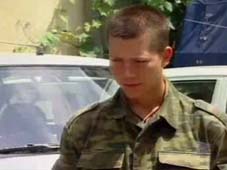Another Russian soldier seeks asylum in Georgia
By Temuri Kiguradze
Friday, July 3

Speaking to Georgian journalists on July 2, Artemyev stated that bad conditions of service were the main reason he had left. “I was treated badly, I was beaten…,” said Artemyev on July 2. “I knew that there was another [Russian] soldier here in Georgia, that’s why I decided to ask you for assistance,” he said, referring to the incident of January 2009 when Russian serviceman Alexander Glukhov also left his post in South Ossetia and crossed the administrative border seeking asylum in Tbilisi.
On June 30 it became known that Glukhov has been given official refugee status by the Georgian authorities, who announced that they have provided him with an apartment in Tbilisi and a job in his chosen field - information technology. Artemyev seems to be following Glukhov’s example, because the Georgian Ministry on Refugee Issues has already confirmed that he has also requested refugee status.
The position that Artemyev served at is in Perevi village, which is now controlled by Russian and South Ossetian military formations. He stated that he had crossed the administrative border at night and was “hiding in the house of a local resident” until morning. On July 2 he was taken to the UN Refugee Agency’s office in Georgia. Its representative stated that Artmeyev has already obtained the status of “political asylum seeker” and recommended that the Georgian Government not return him to Russia where “his rights could be violated again.”
The Russian North Caucasian military district has confirmed the desertion. According to the Russian RIA Novosti news agency, the spokesperson for the district stated that Artemyev left Perevi because of bad treatment from “ethnic North Caucasian co-servicemen” and underlined that Moscow will request that Tbilisi return Artemyev to Russian-controlled territory. This seems unlikely to happen because in January 2009 the same request concerning Glukhov was rejected. Georgian Foreign Minister Grigol Vashadze has stated that Georgia will not send the Russian soldier back to his base because the Russians will “make him rot in jail.” Speaking to The Messenger on July 2, Deputy Georgian Foreign Minister Alexander Nalbandov refused to specify what decision Tbilisi will take in this case, stating that it’s now up to the Refugees Ministry to make this decision.
On May 24 Georgian Lieutenant Alik Bzhania, who was serving in the coast guard, told the Ekho Moskvy radio station that he had fled Georgia to seek political asylum in Russia. In contrast to his Russian counterparts Bzhania gave political conditions in the country as the main reason for his decision. “I love my country, but I can no longer stay on its territory, because I can no longer look on quietly as President Mikheil Saakashvili destroys Georgia from within,” Bzhania said, adding that Saakashvili “is preparing for another war.” This incident produced a sharp reaction from the Georgian side. The Georgian Interior Ministry confirmed that Bzhania had served in the coast guard in the Georgian seaside town of Poti, however he noted that “He was dismissed on May 18, 2009 for multiple violations of discipline.”
“The situation in the Russian Army resembles that in the Soviet Forces; the conditions of service are very poor,” the General Gditor of Georgian military analysis magazine Arsenali Irakli Aladashvili told The Messenger on July 2. “Both Glukhov and Artemyev ran away from three things – humiliation, hunger and cold. It is known that the majority of the resources Moscow provides for keeping its occupation troops in Abkhazia and South Ossetia are spent on planting new landmines on the border, installing artillery devices and similar things, while the living conditions of the common soldiers are awful. The troops we call occupiers spent last winter in tents, which is pretty rough considering that winter in the South Ossetian mountains is very cold.
“The number of Russian soldiers deserting in the country as a whole is counted in the hundreds and thousands every year. Glukhov and Artemyev are part of this trend,” concluded Aladashvili.
